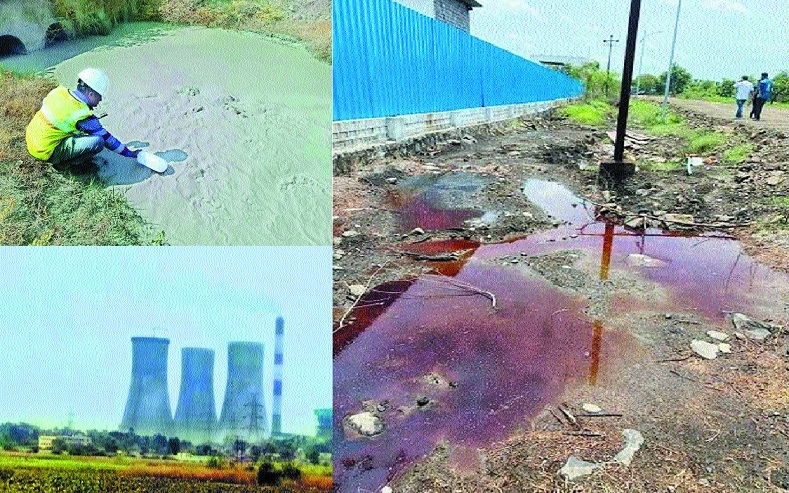Poor show on environment front
| Date :31-Dec-2021 |

By Kaushik Bhattacharya :
IN MARCH this year, Prime Minister Narendra Modi said that country was on track to achieving its climate goals well before the target date as it switched over the energy-efficient mediums and used waste to generate energy. However, Nagpur city which is already in the list of Central Government’s National Clean Air Programme (NCAP) for poor air quality, performed badly in all environmental fronts in 2021. The environment monitoring Government bodies like CSIR-National Environmental Engineering Research Institute (CSIR-NEERI) and Maharashtra Pollution Control Board (MPCB) came up with reports this year which explained the poor performance of Nagpur city in air, water and sound pollution mitigation. If started with the air pollution. The air quality of the city, recently, failed to meet the Central Pollution Control Board (CPCB) guidelines for safe levels. The deteriorating air quality put people at additional risk of respiratory disease and other health problems. The only Continuous Air Quality Monitoring Station (CAQMS) of the city, situated at Civil Lines area, first time in the history recorded the PM2.5 level 222 which is ‘poor’ as per the CPCB guidelines.
However, MPCB claimed that this reading was recorded due to a technical error. Similarly, the noise monitoring by CSIR-NEERI during Diwali this year, by sourcing the data from citizens, has revealed that noise pollution in Nagpur city was higher than that in last two years during Diwali. A careful analysis and evaluation of the data revealed that this Diwali, the overall noise pollution of the city was much higher than that in the last two years. As many as 50 per cent of the noise readings were found between 70 dB and 89 dB, while 29 per cent were between 60 dB and 70 dB, and 21 per cent were below 60 dB. In the city, 46 highly polluted locations had noise levels between 75 dB and 80 dB, whereas 16 areas were severely affected with above 80 dB noise levels. Zone–wise data reveals that Hanuman Nagar, Nehru Nagar, Satranjipura, and Ashinagar zones had critical noise levels above 80 dB. Like air and noise, water pollution was also observed at its peak this year. The Hitavada, throughout the year, pointed out the poor condition of lakes, rivers and other water bodies in the city. While MPCB took action against many factories and firms who failed to comply with the environment norms and polluting water bodies in and around the city. First time in the history, MPCB forfeited the bank guarantee of Rs 25 lakh of Koradi Thermal Power Station (KTPS) for violation of environment norms. Behind this action, the National Green Tribunal (NGT) slammed MPCB for not taking action against government entities like KTPS for violation of environment norms. Similarly, MPCB lodged a First Information Report (FIR) against a tanker (MP-09-HG-1406) for discharging hazardous acidic effluent on land near Vena river in Butibori.
The tanker belongs to Golden Chemical Transport Company, Ingoria Road, Nagde Junction, Ujjain, Madhya Pradesh. The Board also issued closure notice to Crystal Crop Protection Limited for discharging red colour effluent into a water body in Butibori. MPCB issued the closure direction under Section 33A of Water (Prevention and Control of Pollution) Act, 1974 and 31A of the Air (Prevention and Control of Pollution) Act, 1981 for polluting the water body and non-compliance of consent conditions and violation of Zero Liquid Discharge (ZLD) condition. The Board had issued another closure notice to Shilpa Steel and Power Ltd, MIDC, Butibori for releasing hazardous water waste in Wena river. Not just the factories but MPCB also served notices to city hotels, banquet halls and club houses for spreading water pollution. According to Central Pollution Control Board (CPCB) guidelines, hotels, restaurants, etc., must have a mechanism for controlling water pollution by setting up effluent treatment plant (ETP) for treating waste water from the kitchen, laundry and domestic sewage.
However, no hotel or restaurants in the city have ETP for waste water treatment. As per the Air Quality Life Index (AQLI) annual report, the air pollution was found to be cutting short the life expectancy of people in Vidarbha including Nagpur in the range of 3.9 years to 5.05 years! Over the past decade, air pollution has emerged as a major concern for India in general and Vidarbha region in particular. To mitigate all environmental issues, the revised environment action plan for Nagpur was prepared by Nagpur Municipal Corporation (NMC) and MPCB to control air pollution in city is going to be a lengthy exercise as no concrete step has been taken so far by the civic body to match its own deadline of November 2021. The plan emphasises on many factors -- ban on use of age-old vehicles; more use of public transport; curb fuel adulteration; better parking facility; widening of roads; identification of traffic congestion hotspots and much more. However, all claims made by NMC for improvement of city’s air quality is just a cosmetic exercise and the improvement process has already crossed the time limit. The end of 2021 leaving many environmental issues unsolved which should be addressed and solved in 2022 for city’s better future. n